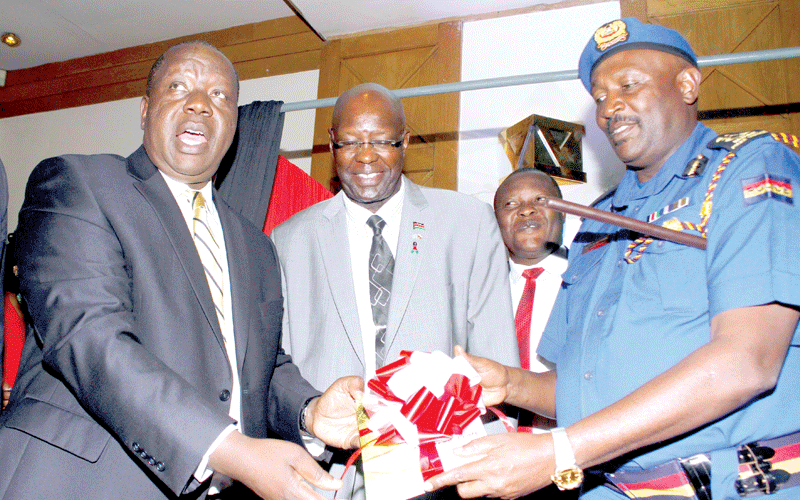Matiang’i accuses Judiciary of frustrating war on drugs
By Editorial, October 1, 2019Bernard Gitau and Seth Onyango
Interior Cabinet secretary Fred Matiang’i yesterday made a scathing attack against the Judiciary, accusing it of being the weak link in the fight against drug trafficking.
Matiang’i, who was flanked by Inspector General of Police Hillary Mutyambai and the Director of Criminal Investigations George Kinoti, accused some judges of shielding drug lords from facing the law.
“These games and shenanigans that we are used to in this country must come to an end; it is unthinkable how somebody can be bonded five or six times,” said the minister, adding that courts’ failure to convict drug dealers had turned Kenya into a consumption hub.
But in a swift rejoinder, the Registrar of the Judiciary Ann Amadi termed Matiang’i’s claims as “irrational”.
“Those are serious allegations, although absurd as they are; only the Chief Justice can comment on them,” she told People Daily on phone.
Amadi, who said she was upcountry, promised to get back once she listens to Matiang’i’s comments.
The minister, who spoke during the launch of the National Authority for the Campaign against Alcohol and Drug Abuse (Nacada) 2019-2022 Strategic Plan, warned that the country could suffer irredeemable harm if drug trafficking is not contained.
Leaked report
His comments could exacerbate simmering tension between the Executive and the Judiciary over President Uhuru Kenyatta’s decision to stall the appointment of newly appointed judges and those who have been promoted.
Yesterday, Matiangi’s cited alleged lenient bail and bond terms that he said are handed out to notorious drug dealers on the premise of respecting their human rights.
“We are told it’s their right; I would like to say it’s also a right for every Kenyan to live without drugs… let us not talk about human rights looking at one side. It is the right of our children to live without these criminals,” he said.
Matiang’i cited the Akasha family drug empire, terming their extradition and successful prosecution in the US as shameful to Kenyan people and an indictment of the Judiciary.
“It is shameful for our country that until the Akashas were extradited to the US, they would probably have had no chance of getting justice in Kenya,” said Matiang’i.
“It is shameful to the citizens of this country that they would be roaming our streets while out on bond and continue with their business to kill more people,” he added.
In May, a leaked report indicated that rampant corruption in the Judiciary was frustrating efforts of a multi-agency taskforce tasked with ridding the country of narcotics.
The report said drug dealers approached judicial officers with mouth-watering deals to get lenient sentences.
“Drug traffickers using proxies have worked their tentacles into some State agencies responsible for battling the vice,” the report read.
When the report was published in the media, Directorate of Criminal Investigations boss Kinoti revealed that dozens of judges and magistrates were under investigations over close links to known narcotics traffickers.
Yesterday, Matiang’i said though the Akashas were arrested numerous times they hardly spent a night in police custody as “they walked in and out”.
Matiang’i urged the Judiciary to do its part. “We have done our part and it’s time for others also to do their part… let them convict people and send people to where they belong, prison,” he said.
Government officials have been indicted as some of those who sustained the Akasha family drug empire through an elaborate bribery scheme.
The Akasha brothers Baktash and Ibrahim, before their extradition to the US, could easily obtain bail, repeated adjournments and generally slow the wheels of justice.
They pleaded guilty to six counts of trafficking and corruption charges in New York. In August, Baktash was sentenced to 25 years in prison. Ibrahim will be sentenced on November 8.
Sweeping changes
On his part, Kinoti vowed to resign if he will be cited as a hindrance to the prosecution of drug lords.
“Police have been the soft target when cases of drug trafficking fail. We must talk the truth and point out where the problem lies,” he said.
On police the sector, Matiang’i said the IG and the National Police Service have conducted sweeping changes in the management of drug investigations.
“We will walk on the path of reform and remain committed. The Central Bank of Kenya, financial reporting centre and anti-money laundering deposit teams have done a commendable job,” he said.
“With the team we have had in the country in the last one year, you can see a sea of change especially on how investigations are going. We are ready to learn,” he added.
Meanwhile, Matiang’i expressed concern over the challenge of drug abuse saying it had affected his own officers.
“There are parts of this country where I am dealing with a chief or two who need to be taken for rehab or their assistants, young police officers committing suicide because of drug abuse. None of us is immune to drug abuse.”
